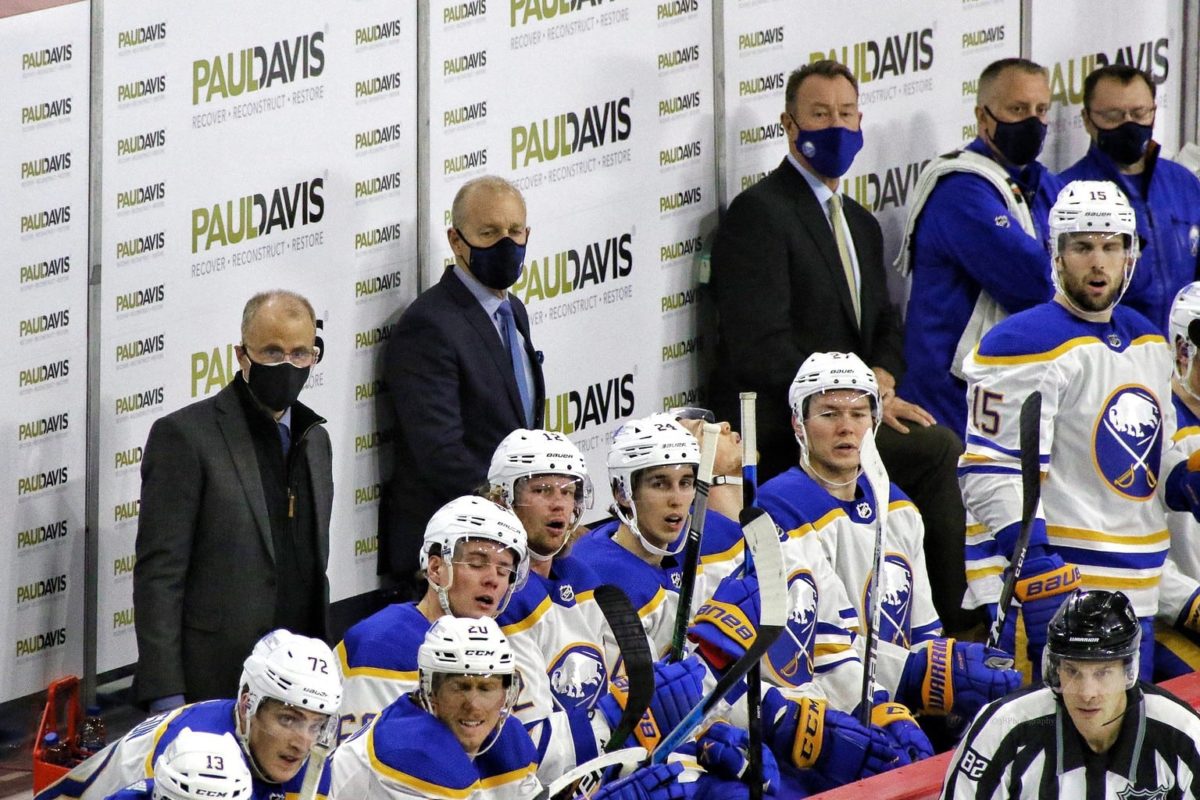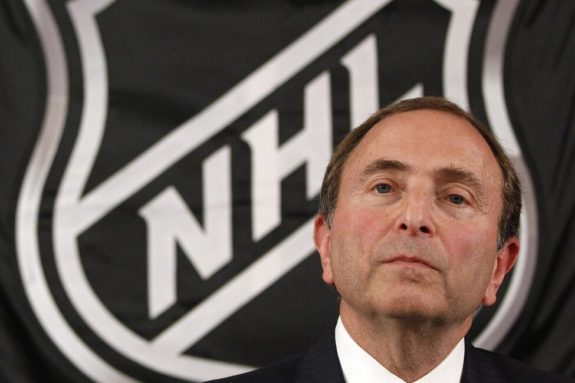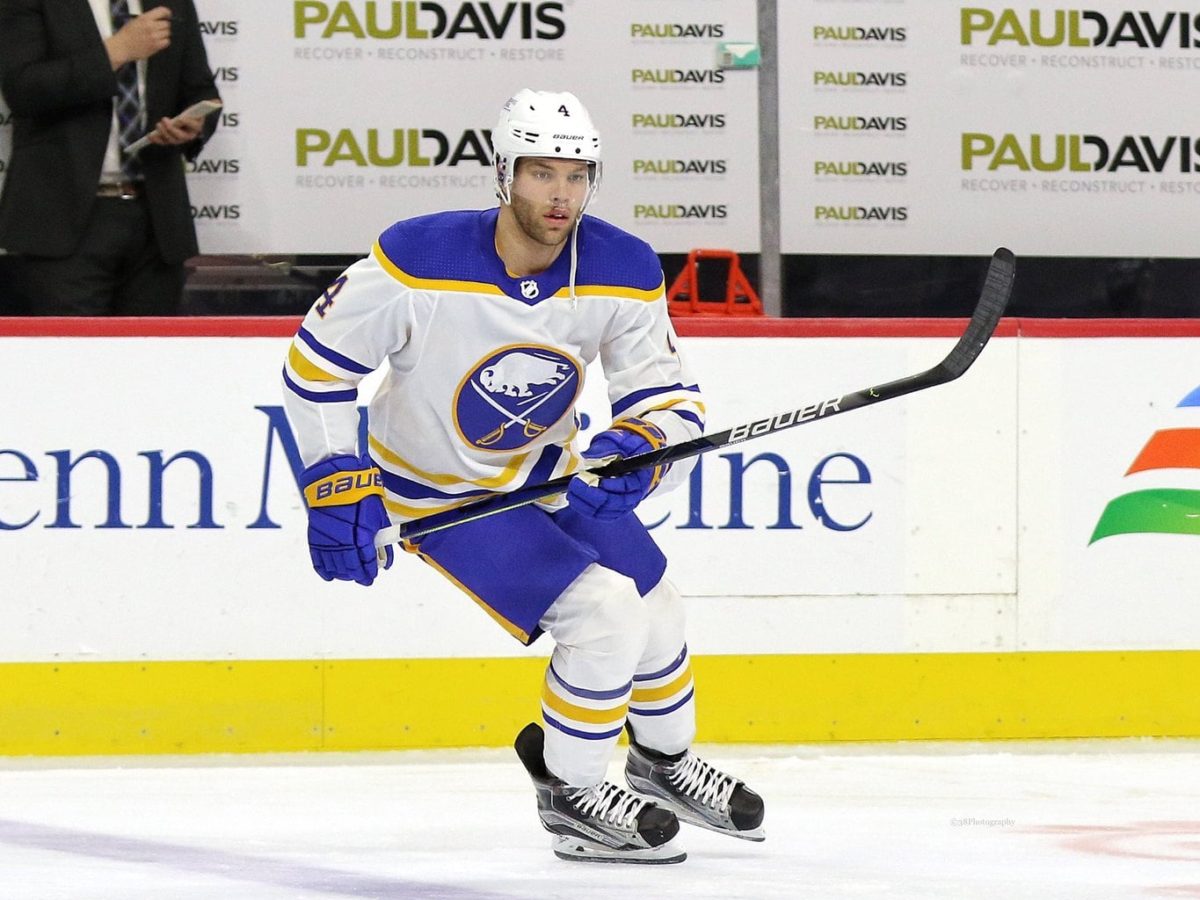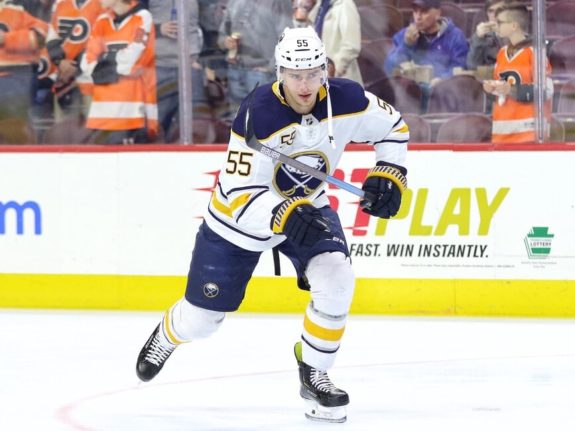The Buffalo Sabres were already having an unusual start to their road trip. Nothing has been ordinary about this season, so the team rolled with the punches. Delay by way of a massive snowstorm prevented the Sabres from traveling to New York to take on the Islanders on Feb. 2. But the team’s season temporarily screeched to a halt when the National Hockey League announced it had postponed Tuesday night’s game until further notice. Hours later, the league shut the team down until at least Feb. 8 and banned them from entering their practice facilities.
How we got to this point has the Sabres organization “furious,” and it should have every hockey fan concerned.
The Details
By now, most of us are familiar with the details. The news came first as a trickle and then a straight downpour. The New Jersey Devils were the Sabres’ opponent for back-to-back matchups on Jan. 30 and 31. On Monday, Feb. 1, the Devils themselves were shut down by the NHL. Fans of their most recent opponent began to worry.
As it turns out, their worry was not misplaced. Of the 17 Devils on the NHL’s COVID-19 protocol list at the time of writing, 12 of them played against the Sabres that weekend. That includes Nathan Bastian, Jesper Bratt, Jack Hughes, Andreas Johnsson, Janne Kuokkanen, Michael McLeod, Kyle Palmieri, Damon Severson, Yegor Shrangovich Ty Smith, Matt Tennyson and Pavel Zacha. At this rate, the Devils are on track to be the first hockey team to reach herd immunity.

By late in the afternoon, Feb. 2, Taylor Hall and Rasmus Ristolainen — one of the team’s top forwards and the team’s top defensemen — were on the COVID list. As a result, the league postponed all Sabres games through Feb. 8. Late on Feb. 9, Tobias Rider and Brandon Montour joined these two. If a player appears on the list, it doesn’t mean they’ve tested positive.
Sabres Are Furious
According to multiple reports, the Sabres organization was/remains furious with the way this played out. Not at the league for stepping in and postponing games mind you, but because of the chance — virtually impossible to prove right now, but likely nonetheless — that the virus transferred from team-to-team during the weekend series. Also because the Sabres saw the potential for this to happen and requested more information regarding the health of their opponents over the weekend but never received it.
Devils goalie MacKenzie Blackwood went on the COVID-19 protocol list Jan. 21 and Travis Zajac was sidelined for COVID reasons on Saturday. Both did not play at all over the weekend. Kyle Palmieri did play on Saturday, but by Sunday, he was also on the COVID list. That’s when the first alarm bells sounded. According to multiple sources, including The Athletic’s John Vogl, the Sabres asked for more information from the league regarding a Devils team that appeared to be dealing with the beginning stages of an outbreak. But they had their request for information denied. By Wednesday, the Devils had 17 players on the COVID list.
“The Sabres believe they were forced into a dangerous situation,” Vogl writes in a piece that appeared on The Athletic Feb. 2. “[They] were wary about playing Sunday, having already faced one Devils player who went into the league’s COVID-19 protocol, but the NHL continued with the scheduled game.”
From ‘NHL postpones Sabres’ next four games due to COVID-19 protocols’, The Athletic 2/2/21
Sabres/Devils Situation is a Flashpoint
By most accounts, return to play 2.0 COVID rules have been working, allowing games to proceed under far from normal circumstances. The league treats positive tests the same as close contacts or players serving required quarantines. NHL players are constantly going on and off “the list” with their team continuing to play games. But what happened between the Devils and the Sabres in the last weekend of January is a flashpoint.
Related: Sabres Weekly: Series Splits, Overtime Losses & Postponed Games
In his latest 31 Thoughts post, Sportsnet’s Elliotte Friedman said nobody should panic and call it the “nuclear scenario,” but he noted that the whole thing was “incredibly concerning” and then quickly moved on. Friedman is a bright man and a well connected NHL analyst. I don’t want to read between the lines too much, but the fact he even made reference to the possibility of this situation blowing up the whole season is a nod towards where this story could go.
It’s obvious that’s not what he is saying at all in the piece, though. I don’t want to be an alarmist here, either. I’m not saying that’s where we are headed. I’m not saying that what happened this week will inevitably lead to the cancelation of the entire season. Still, based on the information that’s out there, it appears as though the Sabres/Devils COVID Kerfuffle could lead the NHL to rethink a few things.
NHL’s Standard Approach to a Deviating Season
The reason why the NHL has so far successfully pulled off the 56-game condensed schedule is that they have strict protocols in place. Many people are working very hard to make sure that inevitable infections don’t spread too far, too wide. And let’s not forget that every time there is a virus-related evolving situation, the league steps in and shuts down the team(s), postpones games and generally takes control.

With this case, infections were allowed to spread in what seems like an entirely preventable way. In fairness, there’s no perfect system, and if a player has the virus but shows no symptoms and tests negative, they’re obviously going to want to play. Aside from that, one could argue (and some are), the signs were present that the Devils had an ongoing, expanding COVID outbreak. But the team was still allowed to play back-to-back matchups only to be shut down a day later. The Sabres now have two of their top players out, with more potentially coming and the entire team is now forced into isolation.
We Knew it Could Happen
We all knew something like this could happen. We watched it take place in Major League Baseball.
Six months ago, baseball writers praised the NHL for their spotless record while the virus had invaded their sport. The Centre for Disease Control and Prevention (CDC) eventually said the 20-player outbreak within the Miami Marlins organization did not result in any secondary transmission during on-field play and that it was likely interactions outside of gameplay that were to blame for the spread.
Related: Devils Defense Turning Heads Early On
The National Football League was the subject of a study the CDC released in January that confirmed there is no evidence to support the notion that football players with the virus on one team can infect players of the opposing team.
“There is no evidence that the virus crossed the line of scrimmage, so to speak,” said Dr. Allen Sills, the NFL’s chief medical officer, on a conference call with reporters, per Friedman.
One thing we all know to be true: hockey is far different from baseball and football, especially in terms of the sheer amount and frequency of close contact. No such study has yet been done on the NHL, but it’s possible the Sabres/Devils situation will spawn one.
Hockey at the Centre of a Super-Spreader Event
The NHL is not of the mindset that transmission of the virus is happening during games, Deputy Commissioner Bill Daly told Vogl. He later noted that the league has not ruled it out.
“We have seen no definitive evidence of cross-team transmission.” – Bill Daly
From ‘How did this happen?: 10 key questions surrounding the Sabres’ current shutdown’, The Atlantic 3/2/21
However, there is precedent for hockey being a sport where transmission of the virus in the course of play is highly likely. In September, for example, in September 2020 there was a cluster of COVID cases among youth hockey teams that practiced at a facility (coincidentally) in New Jersey. The next month, the CDC released the results of a study in its Morbidity and Mortality Weekly Report that describe how an adult indoor hockey game held in Florida in June of 2020 led to a COVID super-spreader event. Also in October last year, 18 members of the Yale University hockey team became infected with the virus in October. The CDC said that in the Florida case, teams were not wearing masks in the locker rooms like NHL teams are.
The large amount of infections that resulted from the Florida event provide evidence for COVID transmission during indoor sporting activities, like hockey, where intense physical activity takes place, the CDC concluded.

The report also states that hockey rinks provide a venue that is “likely well suited to COVID-19 transmission as an indoor environment where deep breathing occurs, and persons are in close proximity to one another.”
“Although more than one player might have been infectious during the game, it is hypothesized that the index patient was the source of SARS-CoV-2 transmission for the other players while he was presymptomatic.”
Of the 22 players that took part in the game in Florida, 14 began showing signs and symptoms of COVID-19, along with one member of the rink staff, for a total of 15 affected people — 13 of whom returned a positive test for the virus. At the time, The CDC’s study on the event was one of only a few published reports available regarding transmission associated with specific sports games or practices.
Where We Go From Here
Going into the season, the NHL mandated daily testing for the first four weeks of the season and then said they’d reevaluate. As Friedman notes, it’s unlikely this will change. It’s possible too, that they will add a second daily rapid test. But no information on this has been released by the league.
Where we go from here is anyone’s guess. Maybe vaccines will become more widely available in the coming months, and the NHL will be able to buy a large portion to inject into all players, coaches, trainers and associated staff.

As a hockey fan myself, I hope that the situation in New Jersey and the potential situation in Buffalo end up like the ones in Columbus and Dallas did, with both teams returning to play in a reasonable amount of time. The latest case, though, is unique in that the other outbreaks happened before the season began, with all players able to isolate before taking part in any games. There was simply no chance for the theory to be tested that transmission of the virus could happen within a game.
Watch and Wait
Outbreaks were not unexpected this season. It’s why the league brought in the taxi-squad, among other measures and precautions. COVID-related absences in other sports are common this year as well, as are the studies on the possibility of presymptomatic players passing on the virus to players on the other team.
The NHL knew going in that the occasional outbreak was unavoidable. They built in time on the backend of the schedule for the inevitability of having to reschedule postponed games. It would take a large super-spreader event to shut down the league entirely, and even then, it’s possible that the NHL would simply suspend play for a few weeks and aim to return when health officials and governments gave the go-ahead. In unprecedented times, all we can do is watch and wait to see what happens next. Nothing is different in this case.